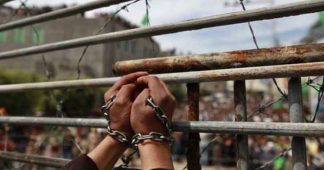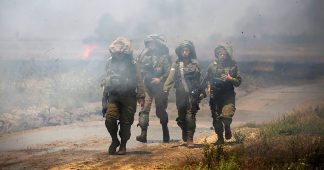Israel outlawed torture more than two decades ago, yet years later evidence of the state’s security services exerting abuse continue to surface
Israel outlawed torture more than two decades ago, yet years later evidence of the state’s security services exerting rampant physical and psychological abuse continue to surface. Human rights groups representing Palestinians who have filed more than one thousand suits alleging torture by the Shin Bet, also known as the Shabak or General Security Service, claim the practice is still endemic and continues in a system with little oversight.
How can torture be both banned and common practice? The answer lies in the organization’s longitudinal development, where secrecy has prevailed. It is governed by policies that are classified and have never been examined by an independent or external body, shielding it from media and public scrutiny.
On 8 February 1949, the Shin Bet was officially formed but it was not until 1957 that the general public became aware of its creation. Its inception fell upon a period where many “threats” were looming overhead for the newly formed state, in the wake of the 1948 war against five neighboring Arab countries and the Palestinian Nakba, the start of the Palestinian refugee crisis where 700,000 vacated their homeland and were either forcibly driven out or left due to fear. Another 156,000 Palestinians remained within Israel – the new government took this as a potential threat.
Initially, the Shin Bet constricted its focus towards half a million Palestinians who had become Israeli citizens in the aftermath of the 1948 war. Today, its mandate covers ensuring state security, dismantling terrorist groups, and counter-espionage.
In this turbulent context, the existence, operations, and tactics of the Shin Bet were kept in the shadows. The organization became the embodiment of its motto – “The defender that shall not be seen.”
The early years
In 1948, Ezra Danin – head of the Haganah’s “Arab Section” – was in charge of “destroying Arab villages.” The Hagana, a Zionist paramilitary force, was the forerunner to the Shin Bet as the former’s forces were drawn from to create the latter after Israeli independence.
In his quest to maintain state control, David Ben-Gurion, Israel’s first prime minister, sustained the British Mandate appointed The (Emergency) Defense Regulations, 1945. These regulations gave Israel, like the British before them, an inordinate degree of powers relating to detention, intelligence, and other law-related matters. In essence, a military government system was present in Israel following independence. This added with the fact that Israel has been in a perpetual state of emergency since independence has legitimized many insidious actions against the Palestinian minority that includes a range of surveillance-based methods adopted by the Shin Bet and police.
The objective was to constrain the Palestinian refugees from re-entering Israel. To achieve this, the Shin Bet, the army, and other agencies used intelligence received from their collaborators which allowed security agencies to drive the refugees back to their camps. In the 1950s, the government of Mapai (The Workers Party) used the Shin Bet to coerce people into voting for the Mapai’s Arab satellite parties. The Mapai used their satellites politically to keep their Arab allies contented and also to use their Arab puppets in the Knesset (parliament) for propaganda purposes.
Although the Shin Bet achieved its goals on various occasions, it was unregulated, during this period, by any law. The Shin Bet was not only considered untouchable but for many years since its formation, remained a secret organization – hidden from the public’s eye. Its clandestine behavior was and still is abetted by Israel’s Military Censor, which aims to restrict the media from revealing sensitive information. In this period, the organization was only answerable to the prime minister; and the masses were not supposed to know the name of the organization’s head and the death of an agent remained unreported.
In the 1950s and 1960s, the Shin Bet would also monitor if the Palestinians celebrated Independence Day with enthusiasm or distaste, and would take action accordingly. In this same period, Palestinians had to get permission from the Regional Arab Committees of Arab Affairs to do rudimentary tasks such as receiving loans, obtaining jobs in the public sector, shifting their residence etcetera – this committee comprised of a Shin Bet officer, military governor, government representative, and a police officer.
The Shin Bet was also invasive in suppressing anti-Israel or anti-government insinuations. The agency was active in the vetting of teachers and principals in the Palestinian school system. Furthermore, the Shin Bet monitored teachers who were seen as being too nationalistic, and if these tendencies proliferated, the agency would intervene and threaten their dismissal. The Shin Bet also used to monitor various aspects of education which included teachers speaking against security agencies; discourses that had anti-Semitic implications; and criticisms of the military government.
Concerning Palestinian politics in Israel, Israel and its agencies used to monitor local elections and education. In local elections, the Jewish government supported the Palestinian clans who were loyal to them by allowing the heads of clans to run the local councils. Furthermore, local authorities, which comprised elected Palestinians, were initiated to provide educated Palestinians with jobs and impede them from adopting undesirable political behaviors. In fact, professor of politics and government at Ben-Gurion University, Ahmed Sa’di, contends that the plan was to include the Palestinians on the fringes of the economy so that their financial survival becomes more valued than their political or moral beliefs.
From 1958-1969 and beyond, the government used ploys such as incentivizing Palestinian youth to study abroad then making their return home challenging; implementing harsher laws; and reducing the Palestinian numbers in integral economic zones etcetera. The government entrusted the Shin Bet and others to gather intelligence to execute said plans.
The military government that was in effect since 1948 was finally discontinued in 1966. In 1967, the Six-Day War erupted between Israel and Jordan, Syria and Egypt. It changed the socio, political, and geographic landscape of the Middle East. Israel took control of the West Bank, Gaza, and East Jerusalem.
In 1976, Israel announced that they would be confiscating Palestinian land for settlement and security reasons – the tragedy that ensued would be remembered as Land Day. This decision was met with massive protests by the Palestinians which caused the IDF and police to be deployed. In the subsequent clashes between the Palestinians and the security forces, six unarmed Palestinian citizens of Israel were killed and around 100 were injured.
Hillel Cohen, an Israeli scholar, mentions a specific instance leading up to the protests in his book on informants “Good Arabs: The Israeli Security Agencies and the Israeli Arabs, 1948-1967.” He states that Tareq ‘Abd al-Hayy, then the mayor of the Arab village of Tira in northern Israel, called the police on the Land Day protesters after he attempted to disband the marchers, but was thwarted by local shop owners. Cohen called this “the swan song of his close relationship with the security forces.”
Following instances like this, the Shin Bet would either intimidate to incentivize working for them as informants, locally referred to as “collaborators.” Possible benefits for informants include a government job or a permit to open a business.
This point is reinforced in the documentary, “Inside the Shin Bet,” by Hussein Abu Hussein, a lawyer, who highlights that due to the poverty-stricken conditions of the Palestinians. He said they become perfect candidates for conscription and Avigdor Feldman, a human rights lawyer, claimed that Arab spies are present in all Palestinian towns.
In 1984, an event unfolded that had grave repercussions for the Shin Bet. The Bus 300 affair shocked the Israeli public and demonized the Shin Bet in the mainstream’s eye. A bus departing from Tel Aviv to the town of Ashkelon was hijacked by four Palestinians who demanded the freedom of 500 Palestinian inmates. The military was involved and in the ensuing operation, two of the four Palestinians were killed, while the other two were captured alive and handed over to the Shin Bet. A military spokesperson lied to the public however that all four perpetrators had been killed in the operation. It was only later that Hadashot, an Israeli newspaper, published a photograph that showed one of the terrorists being taken alive by security agents.
Outraged by this, the public demanded an investigation into this issue. The Zorea Committee, and following it, the Blatman Committee, was appointed to find out the truth, but both failed. It was not until two years later that high-ranking Shin Bet officials revealed agents had lied to the Committee and erroneously faulted a high-ranking IDF official for the murder of two terrorists. The director of the Shin Bet at the time, Avraham Shalom, was heavily involved in the cover-up, as was later disclosed in 1986 when it was discovered that the pair were killed under interrogation.
In May 1986, details were made public regarding the involvement of Shalom in the murder of the two terrorists and his authorization to Shin Bet officials to lie under oath but despite this, the President shockingly pardoned him. Commenting on this incident, Yossi Beilin, the former Israeli Justice Minister, remarked that the general public comprehended that the Shin Bet could be liars and killers. The event brought the elusive agency and its approaches into the public eye for the first time.
The 1980s also witnessed the Nafsu Affair in which IDF officer, Izat Nafsu, confessed to his crimes of improper interrogation methods such as insulting, beating, sleep-depriving, shaking, etcetera. The Nafsu Affair coupled with The Bus 300 affair forced the Israeli government’s hand and it moved towards the regulation of the Shin Bet.
Shin Bet and the legal framework, the 1980s to today
In 1987, the Landau Commission was established by the Knesset to deliberate on Shin Bet’s interrogation methods. The Landau Commission concluded that: the Shin Bet did use violent interrogation techniques, which it must refrain from, but a “moderate level of physical pressure” could be applied in some cases. Initially, the results were looked at in a positive light, although the Commission was and is still criticized for numerous reasons. Firstly, the report has a secret annex, which contains rules for permitted interrogation techniques – this annex has never been made public.
Furthermore, Dr. Ishai Menuchin – Public Committee Against Torture in Israel – comments that this “moderate physical pressure” exemption was eventually subjected to all Palestinians. The “moderate physical pressure” rule was too ambiguous and the Ben-Porat Report exposed that the Shin Bet frequently broke this rule. Moreover, the allowance of “moderate physical pressure” in Shin Bet interrogations was the essence of the problem and made effective supervision useless. In hindsight, the Landau Commission was counterproductive as the jargon of the regulations allowed the Shin Bet to manipulate it to its desired outcome.
In 1999, the Israeli High Court of Justice intervened and stated unequivocally that “physical pressure” is forbidden except in “ticking time bomb” scenarios. In the documentary “The Gatekeepers,” six former Shin Bet directors – Avraham Shalom, Yuval Diskin, Avi Dichter, Yakkov Peri, Ami Avalon, and Carmi Gillon – were interviewed for the first time. In the film, Gillon explains the ticking time bomb justification: the scenario involves a possible terrorist attack and the person the agency is interrogating has information that can foil said attack. This is the only exception to using “physical pressure” according to the court.
What was astonishing is that all of the former heads of the spy agency concluded that violence will beget more violence and that dialogue is the solution for long-term peace. Even Shalom – the infamous director of the Shin Bet during the Bus 300 affair – claims that there is no substitute for “talking.” Dichter says that peace must be built on a system of trust and cannot be obtained militarily while Gillon mentions that Israel would be remiss if they do not engage in peace talks.
If former Shin Bet directors believe that force is not the solution then there must be some credence to their thoughts.
In 2002, new legislation was finally approved by the Knesset which was the first law that centered on the intelligence community. The legislation called the “Shin Bet Law,” took many years to finally approve. After the law, the Shin Bet and other agencies were no longer shrouded in secrecy and under the aegis of this law, Shin Bet’s internal and external supervisions became regulated. Yet tragically, the most controversial aspect of interrogation methods was surprisingly untouched by the law. The Knesset was content with the ruling made by the Israeli High Court of Justice and that this was to remain the ruling on Shin Bet’s interrogation techniques. The Shin Bet still works under the Prime Minister but its actions have become regulated than in the past – at least on paper. The Knesset Foreign and Security Committee is the body that makes sure if the agency is functioning within the framework of the law.
B’Tselem reports that Palestinians who have undergone Shin Bet interrogations state that “they are held in inhuman conditions, including narrow, windowless cells…” – others “reported exposure to extremes of heat and cold, as well as sleep deprivation.” Tal Steiner wrote in Haaretz the case of murder suspect Palestinian Samer Arbid who was hospitalized in September 2019 due to multiple broken ribs and kidney failure. She states that he was tortured by the Shin Bet and when an investigation was conducted, it was, like hundreds before it, found that there was no wrongdoing by the agency. She writes that “This sends a resounding message to every Shin Bet interrogator: It doesn’t matter what you do during the interrogation, how much violence you use against the interrogee or what the results are, the system will defend you.”
Since 2001 around 1,200 complaints of allegations of agents using violence during Shin Bet interrogations have been filed, yet there have been no indictments, according to the Israeli Committee Against Torture. The group estimates that it takes around 39 months for each claim to be processed, which is done by an evaluation of statements from the complainant and the interrogator. The Shin Bet does not record or keep records of tactics used during interrogation.
The volume of complaints quadrupled between 2012 and 2015, according to information supplied by the Israeli government to its high court. The influx came after the court allowed for allegations of torture to be perused in criminal proceedings. Even so, a group of human rights organizations representing Palestinians in torture cases, logged over 850 torture complaints that were sent to the attorney general between 2001 and 2014, of which were not investigated.
Unfortunately, the Shin Bet did not heed the advice of these ex-heads, and human rights abuses continued. Philosopher Yeshayahu Leibowitz’s eminent 1968 prediction of Israel’s occupation careening the country towards authoritarianism resonates today. He prophesied, “A state ruling over a hostile population of 1 million foreigners will necessarily become a Shin Bet state.”
Published at mondoweiss.net











